|
|
|
Sort Order |
|
|
|
Items / Page
|
|
|
|
|
|
|
| Srl | Item |
| 1 |
ID:
093386
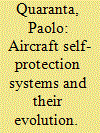

|
|
|
| 2 |
ID:
190348
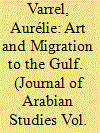

|
|
|
|
|
| Summary/Abstract |
This article presents an alternative narrative about the role of transnational migration in Gulf societies, that was developed in the contemporary art scene. It was presented in 2016–17 in the shape of an exhibition at the third Kochi-Muziris Biennale of Contemporary Art in Kerala, South India and explored how contemporary art can provide a space of freedom to address certain delicate issues in the Gulf context. The exhibition was put on by a collective based in Dubai, but was presented abroad at a Biennale located in the state of Kerala that is famous for its massive outmigration to the Middle East. The article examines how this context of production influenced the contents presented at the Biennale, and considers how it may have been received.
|
|
|
|
|
|
|
|
|
|
|
|
|
|
|
|
| 3 |
ID:
132342
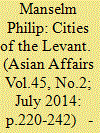

|
|
|
|
|
| Publication |
2014.
|
| Summary/Abstract |
Global cities are almost by definition somewhat detached from their geographical hinterlands. Cosmopolitan and modern, they are open to external influences from other cultures and from overseas trade. But they are also vulnerable to the rise of nationalism in the country which surrounds them, as is shown by the fate of three famous cities of the Levant, Alexandria, Smyrna and Beirut. They were multicultural trading cities, linking the economies of Europe and Asia, "windows on the world", in contrast to inland capitals like Cairo Ankara and Damascus. New global cities like London, Hong Kong and Dubai also have hybrid and polyglot inhabitants, like Levantine cities of bygone days. But they will need support if their cosmopolitanism is to prevail over nationalism.
|
|
|
|
|
|
|
|
|
|
|
|
|
|
|
|
| 4 |
ID:
101824
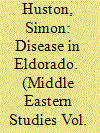

|
|
|
|
|
| Publication |
2011.
|
| Summary/Abstract |
Some consider the Emirate of Dubai, within the United Arab Emirates (UAE), a modern Eldorado and blueprint for development. Others question its governance, sustainability and labour practices. Sober judgement of the alternate Dubai narratives stumbles on definitional ambiguities, urban perspective intractability and empirical uncertainty. Definitions of governance and sustainability are particularly contested and presumptions of a universal city blueprint are considered alchemy. Nevertheless, a metaphorical Eldorado is a useful starting point for structured discussion. Acknowledging complexity and data limitations, the paper sketches some likely constituents of a modern Eldorado and then compares it with conditions in the oriental former boomtown. Tentative preliminary indications suggest that Dubai, as many other cities, is overbuilt and unhealthy. Notwithstanding some phantasmagorical projects and scattered architectural icons, disease manifests itself in governance concerns, economic volatility, urban sprawl and social fragmentation. Vectors for disease are excessive regional oil liquidity, constitutional constraints, a narrow commercial focus and institutional limitations. The result: impressive growth is driven by factor accumulation and undermined by overcrowding and pollution. Reforms to the current quasi-feudal modus operandi challenge powerful vested interests in the mercantile Emirate but the global financial crisis could herald beneficial reform.
|
|
|
|
|
|
|
|
|
|
|
|
|
|
|
|
| 5 |
ID:
082486
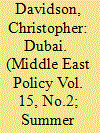

|
|
|
| 6 |
ID:
090266
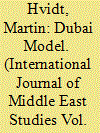

|
|
|
|
|
| Publication |
2009.
|
| Summary/Abstract |
The developmental process as it unfolds in Dubai has hardly been analyzed by academics. Most current knowledge about the country originates from media coverage, especially from news magazines and business literature. Recently a number of social science based but historically oriented academic publications have appeared. Only one study, however, has seriously sought to place Dubai in a broader developmental framework: Sampler and Eigner's From Sand to Silicon, published in 2003. Yet, by applying the so-called strategic trajectory model to the case of Dubai, they reduce their focus to the management side. Their aim is too narrow to provide an explanation of the overall development process in Dubai.
|
|
|
|
|
|
|
|
|
|
|
|
|
|
|
|
| 7 |
ID:
076482
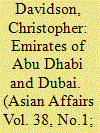

|
|
|
| 8 |
ID:
137999


|
|
|
|
|
| Summary/Abstract |
For those who know only the Dubai of today, the author provides a fascinating glimpse pf the Trucial Coast of the last century.
|
|
|
|
|
|
|
|
|
|
|
|
|
|
|
|
| 9 |
ID:
129891
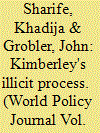

|
|
|
| 10 |
ID:
190346
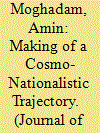

|
|
|
|
|
| Summary/Abstract |
The art world is commonly seen as being conducive to the emergence of cosmopolitan spaces and sociabilities. However, this cosmopolitanism cannot be understood without observing the specific characteristics of the field of art and the socio-political context in which it emerges. This article examines how the internationalization and diversification of actors involved in the art scene in Tehran, reconfigures power relations and creates new relationships of interdependence, alignment or domination between actors from diverse social and geographical backgrounds. The focus is on the connections between Dubai and Tehran forged through artistic practices, via the analysis of a key actor: the “cultural entrepreneur”. In this sense, cosmopolitanism is considered both through the individual trajectory of the cultural entrepreneur, strongly anchored in the Iranian national context, and as a characteristic of urban spaces and sociabilities generated by artistic dynamics.
|
|
|
|
|
|
|
|
|
|
|
|
|
|
|
|
| 11 |
ID:
164400
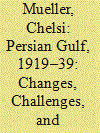

|
|
|
|
|
| Summary/Abstract |
The interwar period (1919–39) was a formative period in the Persian Gulf. These years marked a transition from a Gulf society once characterized by symbiosis and interdependency to a sub-region characterized by national divisions, sectarian suspicions, rivalries and political tension. This period witnessed a surge of anti-colonial and nationalist feeling in Iran, the rise of a stridently nationalist military leader in the person of Reza Shah Pahlavi, his implementation of an assertive Persian Gulf policy and his re-assertion of Iran’s claims to coastal territories ruled by Arab shaykhs under British protection. The challenge posed by ascendant Iran to Britain’s dominant position in the Persian Gulf generated an abrupt shift from indirect to direct forms of colonial penetration in the Gulf Arab shaykhdoms and a transfer of Britain’s locus of power from the Iranian to the Arabian littoral. This article surveys the wide-ranging political, economic and social processes that transformed the Persian Gulf community into a sub-region of Arab-Iranian rivalry during the interwar period.
|
|
|
|
|
|
|
|
|
|
|
|
|
|
|
|
| 12 |
ID:
190345
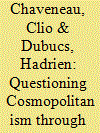

|
|
|
|
|
| Summary/Abstract |
Owing to their diverse populations and particular social configurations, the United Arab Emirates offer a unique urban context in which to question the notion of cosmopolitanism and its daily manifestations, since the main cities of the Emirates maximize occasions for intercultural interaction while maintaining major economic divisions and social hierarchies in most parts of daily life. While national and ethnic categories in the Emirates are often presented in the literature as being rigid, this paper argues that a biographical approach allows for a finer analysis of cosmopolitan situations. The French residents of Abu Dhabi and Dubai, relatively privileged migrants, position themselves along a wide spectrum of places and activities, raising different social and urban issues. Based on 26 months of participant observation in Abu Dhabi and Dubai and 12 in-depth interviews with French residents of the UAE, this paper shows that their forms of sociability, social practices, and international mobility work together to shape diverse and sometimes paradoxical forms of openness to national, ethnic, or social “others”.
|
|
|
|
|
|
|
|
|
|
|
|
|
|
|
|
| 13 |
ID:
178039
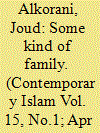

|
|
|
|
|
| Summary/Abstract |
This article follows one woman’s serial migration to, away from, and back to Dubai in order to consider the intersections of migration, subjectivity, and piety. It analyzes how Hanna’s migratory journey, or hijra, relates to her desire to become pious and reveals how people in her life shape the trajectories of both her faith and her movement. Engaging scholarship on migration and ethical subjectivity, it traces how Hanna’s mobility runs parallel to her attempt to surround herself by those who make her piety possible. Whether it is the relationship with her parents and siblings in Birmingham, or the community of “sisters in Islam” she establishes in Dubai, Hanna is moved both by aspirations of piety and by the people who support (or inhibit) her efforts, highlighting the social nature of the geographic places she moves through and inhabits. Recognizing the ability of others to help or hinder her spiritual goals, Hanna actively seeks to settle amongst those who motivate and empower her to become the ideal Muslim she desires to be. Seen in this way, Hanna’s experience allows us to shift from a notion of subjectivity premised upon individualized acts of self-cultivation like prayer, fasting, or veiling to an appreciation of the intersubjective role of others in the development of the self. Combining this intersubjective lens with an alternative account of mobility, I argue for understanding Hanna’s self-positioning as an act that is not only geographic, but (inter)subjective, with the trajectory of her piety discernible both geographically and socially.
|
|
|
|
|
|
|
|
|
|
|
|
|
|
|
|
|
|
|
|
|